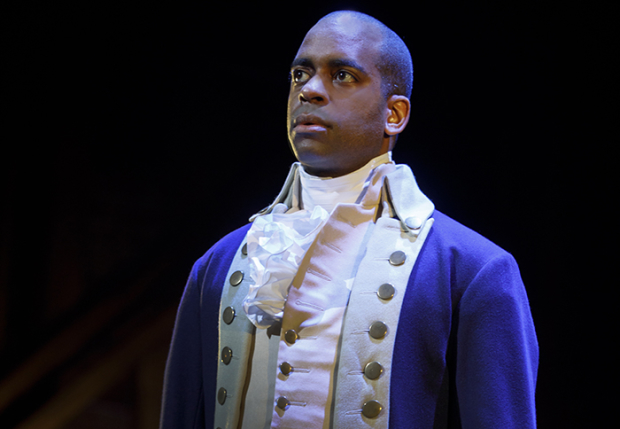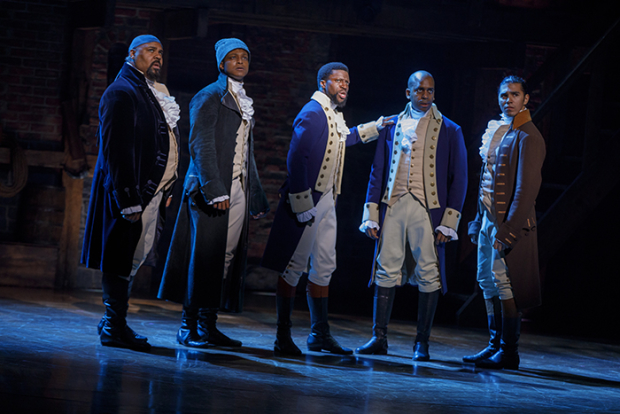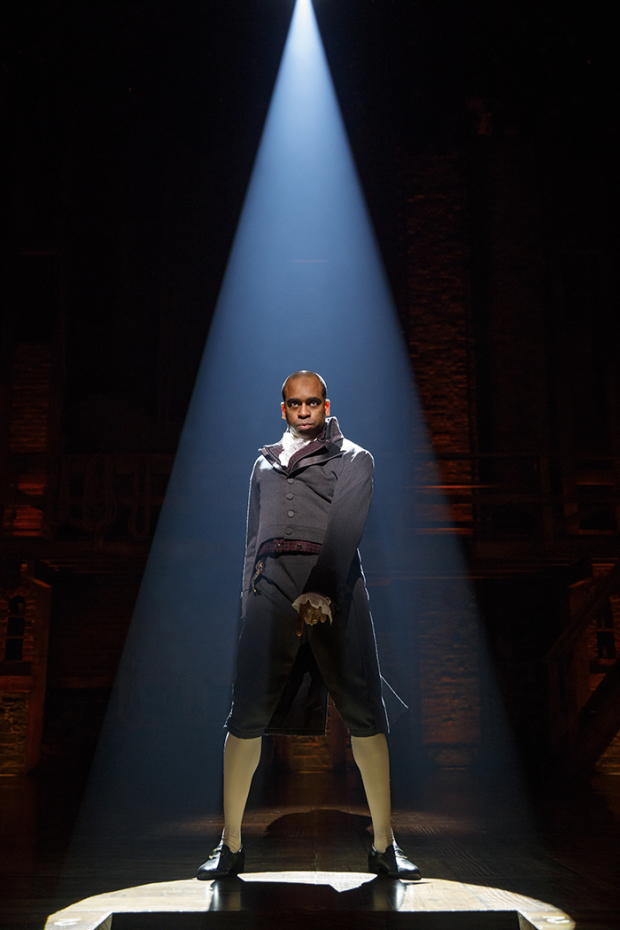How Hamilton's Daniel Breaker Built a Burr for the Ages
Daniel Breaker is coming up on his second anniversary as Hamilton's Aaron Burr — a four-month run in the Chicago cast followed by an auspicious transfer to Broadway, where he's been performing at the Richard Rodgers Theatre since late August 2017.
Breaker may have been Chicago's third Burr and Broadway's fourth, but you won't see shadows of any Burrs past in his rendering of history's favorite villain. A Juilliard-trained Shakespearean actor who happened to find a niche in Broadway musicals like Passing Strange, Shrek, and The Book of Mormon, Breaker is most creatively energized when he's reconstructing the great characters from the classic theatrical canon — a status he's all but certain the characters in Lin-Manuel Miranda's Hamilton are, at the very least, on their way to solidifying.
"With Shakespeare, you learn the form, and then you learn the expression within the form. To approach Hamilton is really the same," Breaker said in a recent conversation about putting his personal thumbprint on Aaron Burr. "Not only are people going to see what Lin has created, but people are also going to see certain actors play these parts. It's why Hamlet is done over and over again. It's why A Midsummer Night's Dream is done over and over again…"
And it's why Daniel Breaker's Aaron Burr will blow you all away.

(© Joan Marcus)
How long into the public obsession with Hamilton were you introduced to Hamilton?'
I was reluctant to see Hamilton because of all the noise that was being made about it. I thought, "No way, it's not going to be that good. I don't buy it." So I saw it fairly late in the game. And as soon as I saw it, I thought, "I need to be in this show."
Was Burr the role that stood out to you from the start?
I was very adamant about putting my name in the hopper that I wanted to be in that show — in some configuration, anywhere, any production. But ultimately I thought the Burr role was just so interesting. It's equal parts Salieri from Amadeus, Iago [from Othello], and a touch of Mos Def. I just loved watching a character trying to navigate through his primary flaw, which is ambition and envy. And what was fun is, Burr is a man who doesn't even realize he's that envious until it's too late.
When the role was finally yours, what was your first step in figuring out who Burr was for you?
Text. Coming from my training and my college years, it's all about: What is this person saying? And because this show has a lot of text, it was a thrill. But the character doesn't really start until somewhat later for me. I find that I didn't really build my Burr or find out who Burr was for me until a good month into the run of the show.
What was it that you felt you had found when you found it?
What I didn't realize was that Burr was pretty funny. My initial impression of Burr was something a little more brooding and serious — tormented throughout. But it doesn't feel that way for me. He could have been as successful as Hamilton, but his envy and jealousy and poorly placed ambition got in the way. To meet a character that is actually put together — he's charming, he's witty, and he's got a funny approach to the world — and to watch that fall apart over the course of three hours is good theater. That's why I really compare him to Iago. He's got language, he's a narrator, he's got expression, but he's got this flaw that is going to be his downfall.

(© Joan Marcus)
And yet unlike Iago, he didn't plan for any of this to happen.
I feel like that's one of the big flaws that people play with villains in general. People think that they need to be twisting their mustaches and tying women to train tracks. But I think our favorite villains in all art have a certain level of charm to them. It allows us to root for them, feel sorry for them, and hate them at different times throughout a story. There is a real friendship between [Hamilton and Burr]. There are moments where they disagree with each other or feel a little jealous of each other, but it is a bond. And to watch that bond fall apart is just good theater.
After you came to this revelation about Burr, which of your line deliveries changed the most?
There's a new one that I realized: "Even though we started at the very same time, Alexander Hamilton began to climb." I used to play it as excitement or wonder — like, Oh my gosh, he began to climb! But now it's more like, Look at Hamilton. Always successful, always so good, everybody loves Hamilton, nah nah nah nah nah.
Which moments in the show help you punctuate the major waypoints in Burr's downfall?
The fact that Burr asks question after question after question: "How does a bastard…" or "How does Hamilton…" It's driving him crazy that he does not know how this man can produce so much content and succeed every step of the way in the way that Burr does not know how to do. There are small questions, there are big questions, sometimes I ask them in a sort of loose way, or I ask them in an obsessive way. Those are always great little spots to dig into. That ultimately helps feed my Burr as he goes through the show.
Which of Lin-Manuel Miranda's lyrics are your favorite to deliver every night?
Lately, "Dear Theodosia" has been a favorite sequence of lines for me. I've been a father for 10 years — I have two boys. And there are still moments I have that are full of wonder. I work nights, so I come in and I see my boys asleep on the bunk beds and I do have moments of full vulnerability — full emotional exposure when I think about responsibilities that I have as a father, but also the undying love that I have for these two boys.

(© Joan Marcus)











